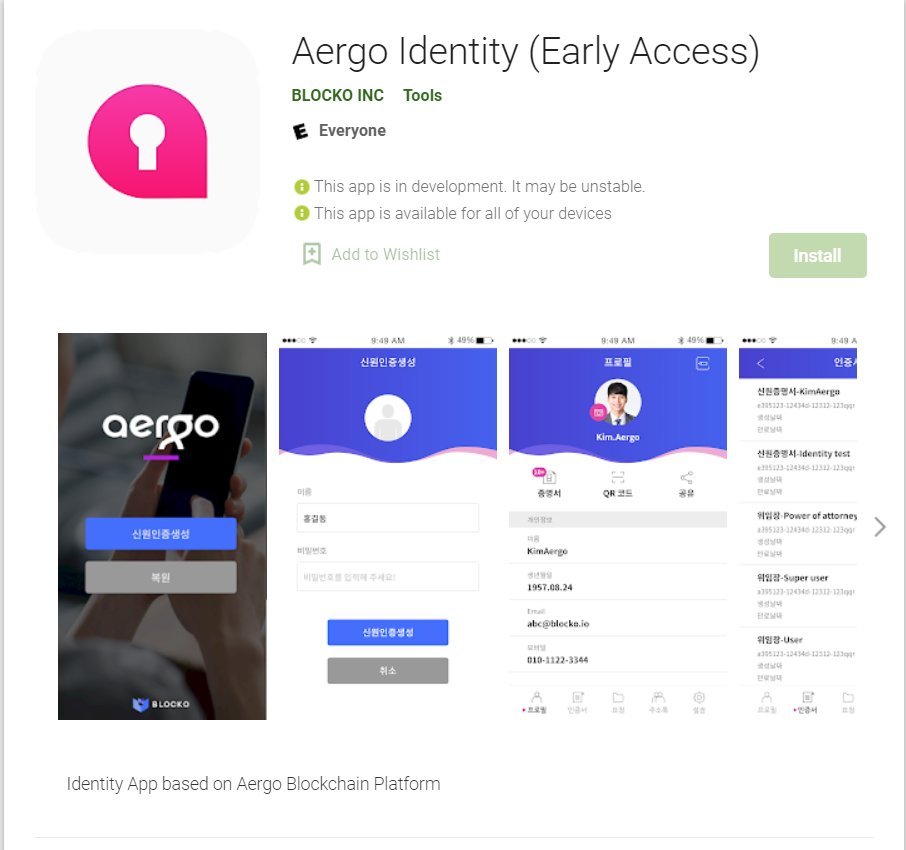The Aergo Identity (Early Access) app from Blocko has been released. You can download it at GooglePlay.
The main characteristics can be found on GitHub.
Aergo DID Method Specification
Author
Preface
The Aergo DID method specification conforms to the requirements specified in the DID specification.
Abstract
The described DID method allows any Aergo smart contract or key pair account to become a valid identity. An identity needs no registration. In the case that key management or additional attributes such as “service endpoints” are required, we deployed did registry smart contracts on:
- Mainnet:
AmgUfj2ghDBRJsmpuSvBZq1Zp67kMc8QX72r1Eh7aS24ueADStPv - Testnet:
AmhPkt8JXujkN6TWEJbynaXqnQUh1AfUckJEyDvTYoA3PyXXf7as
Since each Aergo transaction must be funded, in order to update attributes, account balance must be greater than zero.
Identity Ownership
By default, each identity is controlled by itself. Each identity can only be controlled by a single address at any given time. By default, this is the address of the identity itself. The owner can replace themselves with any other Aergo address.
Context Definition
Note, this DID method specification uses following types:
Secp256k1VerificationKey2018( same as used for Ethereum )Secp256k1SignatureAuthentication2018( same as used for Ethereum )
And following options for key values:
aergoAddresspublicKeyHexpublicKeyBase64publicKeyBase58
DID Method Name
The namestring that shall identify this DID method is: aergo
A DID that uses this method MUST begin with the following prefix: did:aergo. Per the DID specification, this string MUST be in lowercase. The remainder of the DID, after the prefix, is specified below.
Method Specific Identifier
The method specific identifier is same as the following:
aergo-did = "did:aergo:" specific-idstring
specific-idstring = [ aergo-network-id ":" ] aergo-address
aergo-network-id = "mainnet" / "testnet"
aergo-address = 52*Base58Check
The Aergo address is case-sensitive.
Note, if no public Aergo network was specified, it is assumed that the DID is anchored on the Aergo mainnet per default. This means the following DIDs will resolve to the same DID Document:
did:aergo:mainnet:AmgFiAupQBr7tx4CLkoV7uZhsMYDNjM5tsQUREKfdtwpGqsm3R9s
did:aergo:AmgFiAupQBr7tx4CLkoV7uZhsMYDNjM5tsQUREKfdtwpGqsm3R9s
CRUD Operation Definitions
Create (Register)
In order to create a DID, an Aergo address, i.e., key pair, needs to be generated. At this point, no interaction with the target Aergo network is required. The holder of the private key is the entity identified by the DID.
The minimal DID document for a an Aergo address, e.g., AmgFiAupQBr7tx4CLkoV7uZhsMYDNjM5tsQUREKfdtwpGqsm3R9s with no transactions to the did registry looks like this:
{
'@context': 'https://w3id.org/did/v1',
id: 'did:aergo:AmgFiAupQBr7tx4CLkoV7uZhsMYDNjM5tsQUREKfdtwpGqsm3R9s',
publicKey: [{
id: 'did:aergo:AmgFiAupQBr7tx4CLkoV7uZhsMYDNjM5tsQUREKfdtwpGqsm3R9s#owner',
type: 'Secp256k1VerificationKey2018',
owner: 'did:aergo:AmgFiAupQBr7tx4CLkoV7uZhsMYDNjM5tsQUREKfdtwpGqsm3R9s',
aergoAddress: 'AmgFiAupQBr7tx4CLkoV7uZhsMYDNjM5tsQUREKfdtwpGqsm3R9s'}],
authentication: [{
type: 'Secp256k1SignatureAuthentication2018',
publicKey: 'did:aergo:AmgFiAupQBr7tx4CLkoV7uZhsMYDNjM5tsQUREKfdtwpGqsm3R9s#owner'}]
}
Read (Resolve)
The DID document is built by using read only functions and contract events on the did registry.
Any value from the registry that returns an Aergo address will be added to the publicKey array of the DID document with type Secp256k1VerificationKey2018 and an aergoAddress attribute containing the address.
Owner Address
Each identity always has an owner address. By default it is the same as the identity address, but check the read only contract function identityOwner(address identity) on the deployed version of the did registry contract.
The identity owner will always have a publicKey with the id set as the DID with the fragment #owner appended.
An entry is also added to the authentication array of the DID document with type Secp256k1SignatureAuthentication2018.
Enumerating Contract Events to build the DID Document
The did registry contract publishes three types of events for each identity.
DIDOwnerChangedDIDDelegateChangedDIDAttributeChanged
If a change has ever been made for an identity the block number is stored in the changed mapping.
The latest event can be efficiently looked up by checking for one of the 3 above events at that exact block.
Delegate Keys
Delegate keys are Aergo addresses that can either be general signing keys or optionally also perform authentication.
The only 2 delegateTypes that are currently published in the DID document are:
veriKeywhich adds aSecp256k1VerificationKey2018to thepublicKeysection of the DID document.sigAuthwhich adds aSecp256k1SignatureAuthentication2018to thepublicKeysection of document. An entry is also added to theauthenticationsection of the DID document.
Only events with a validTo in seconds greater or equal to the current time should be included in the DID document.
Public Keys
The name of the attribute added to did registry should follow this format:
did/pub/(Secp256k1)/(veriKey|sigAuth)/(hex|base64|base58)
Hex encoded Secp256k1 Verification Key
A DIDAttributeChanged event for the identity AmgFiAupQBr7tx4CLkoV7uZhsMYDNjM5tsQUREKfdtwpGqsm3R9s with the name did/pub/Secp256k1/veriKey/hex and the value of 416d67466941757051427237747834434c6b6f5637755a68734d59444e6a4d357473515552454b66647477704771736d33523973 generates a public key entry like the following:
{
id: "did:aergo:AmgFiAupQBr7tx4CLkoV7uZhsMYDNjM5tsQUREKfdtwpGqsm3R9s#delegate-1",
type: "Secp256k1VerificationKey2018",
owner: "did:aergo:AmgFiAupQBr7tx4CLkoV7uZhsMYDNjM5tsQUREKfdtwpGqsm3R9s",
publicKeyHex: '416d67466941757051427237747834434c6b6f5637755a68734d59444e6a4d357473515552454b66647477704771736d33523973'
}
Base64 encoded Secp256k1 Verification Key
A DIDAttributeChanged event for the identity AmgFiAupQBr7tx4CLkoV7uZhsMYDNjM5tsQUREKfdtwpGqsm3R9s with the name did/pub/Secp256k1/veriKey/base64 and the value of QW1nRmlBdXBRQnI3dHg0Q0xrb1Y3dVpoc01ZRE5qTTV0c1FVUkVLZmR0d3BHcXNtM1I5cw== generates a public key entry like this:
{
id: "did:aergo:AmgFiAupQBr7tx4CLkoV7uZhsMYDNjM5tsQUREKfdtwpGqsm3R9s#delegate-1",
type: "Secp256k1VerificationKey2018",
owner: "did:aergo:AmgFiAupQBr7tx4CLkoV7uZhsMYDNjM5tsQUREKfdtwpGqsm3R9s",
publicKeyBase64: "QW1nRmlBdXBRQnI3dHg0Q0xrb1Y3dVpoc01ZRE5qTTV0c1FVUkVLZmR0d3BHcXNtM1I5cw=="
}
Base58 encoded Secp256k1 Verification Key
A DIDAttributeChanged event for the identity AmgFiAupQBr7tx4CLkoV7uZhsMYDNjM5tsQUREKfdtwpGqsm3R9s with the name did/pub/Secp256k1/veriKey/base64 and the value of 0xb97c30de767f084ce3080168ee293053ba33b235d7116a3263d29f1450936b71 generates a public key entry like this:
{
id: "did:aergo:AmgFiAupQBr7tx4CLkoV7uZhsMYDNjM5tsQUREKfdtwpGqsm3R9s#delegate-1",
type: "Secp256k1VerificationKey2018",
owner: "did:aergo:AmgFiAupQBr7tx4CLkoV7uZhsMYDNjM5tsQUREKfdtwpGqsm3R9s",
publicKeyBase58: "AmgFiAupQBr7tx4CLkoV7uZhsMYDNjM5tsQUREKfdtwpGqsm3R9s"
}
Service Endpoints
The name of the attribute should follow this format:
did/svc/[ServiceName]
A DIDAttributeChanged event for the identity AmgFiAupQBr7tx4CLkoV7uZhsMYDNjM5tsQUREKfdtwpGqsm3R9s with the name did/svc/PowService and value of the URL https://pow.aergo.io generates a service endpoint entry like the following:
{
type: "PowService",
serviceEndpoint: "https://pow.aergo.io"
}
Update / Delete (Revoke)
The DID Document may be updated by invoking changeOwner, setAttribute, revokeAttribute, addDelegate, revokeDelegate on did registry smart contract functions.
These functions will trigger the respective Aergo events which are used to build the DID Document.
Security Considerations
Aergo Identity is based on Aergo blockchain. Aergo blockchain provides security against following risks:
- Replay Attacks
- DoS Attacks
- Man-in-the-middle Attacks
- Non-repudiation
- Byzantine fault
Aergo Identity utilizes Sodium for encryption used in communication between mobile devices and servers.
Sodium sealed boxes are used for sending messages from/to mobile devices.
Privacy Considerations
Aergo Identity strictly follows Privacy by Design guidelines provided by W3C.
Aergo Identity does not store any personal information.
DID document contains only did, public keys, and service endpoints.
All personal information is stored in users mobile devices and user decides which information to disclose.
References
[1] Aergo: https://www.aergo.io
[2] Aergo Project Github: https://github.com/aergoio
[3] W3C Decentralized Identifiers (DIDs): https://w3c-ccg.github.io/did-spec/
